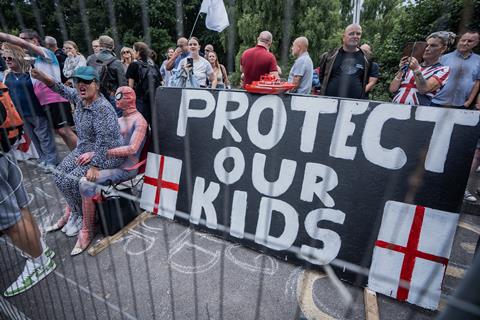Growing up in Telford during the grooming gangs scandal, Emma Hide has seen difficult issues around race and immigration being politicised. But polarising the debate over asylum seekers only silences legitimate concerns and fuels extremism, she says. Christians are called to a radically different approach

Immigration is one of the most contested issues in British public life. Switch on the news and you’ll often hear the same polarised script: those who raise concerns are branded anti-immigration, while those who express solidarity are labelled naive.
It’s as if we are forced into one of two camps, with no room for nuance.
But reality is rarely that simple. The immigration debate is complex, touching everything from asylum seekers to labour shortages, housing pressures to questions of national values and identity.
Many ordinary people hold a mixture of convictions: compassion for those arriving in desperate need alongside concern for the wellbeing of existing communities. But sadly, the media’s binary framing often flattens this nuance - and leaves people feeling misrepresented and fearful of having an honest conversation.
As Christians, we have an opportunity to model a different approach. We can demonstrate that it is possible to engage honestly and respectfully with the complexities, challenges and hopes that immigration brings.
The danger of polarised debate
When respectful discussion becomes difficult, the consequences are serious. Just look at what happened in America this week.
We also see this in the rise of angry demonstrations outside asylum seeker hotels and the escalation into violence in some of our towns and cities. History shows us that when people feel silenced or ignored by leaders, frustration festers — sometimes with tragic results.
Polarised debate helps no one. It silences legitimate concerns, fuels extremism and puts lives at risk
Even at a personal level, conversations about immigration can feel fraught. Perhaps you, like me, have held back from sharing your views for fear of being judged or pigeon-holed. I’ll admit, I even feel nervous writing this article. And yet unless we find ways to talk honestly and respectfully about immigration, we risk perpetuating a culture of mistrust, fear and violence.
A lesson from Telford
Growing up in Telford, my main reference point for debates around immigration was the deeply politicised issue of grooming gangs — groups of men who manipulate, coerce and abuse vulnerable girls and women. I saw how a refusal to speak openly about difficult issues had devastating effects on my hometown.
In 2022, the Independent Inquiry into Telford Child Sexual Exploitation report acknowledged that around 1,000 children were likely abused between the 1980s and the 2000s. While most suspects were reported to be of southern Asian heritage, the inquiry noted that offenders came from a range of ethnic backgrounds, including white British. Two girls I went to school with experienced heartbreaking loss when female relatives were groomed and killed. These tragedies scar our community forever.
Yet, while abuse was literally happening on our doorstep for decades, the public conversation about it was often stifled and distorted. At one extreme, far-right groups hijacked the scandals to promote racist agendas — protests I remember vividly and with sadness. At the other extreme, the 2022 report explained how authorities admitted to holding back from decisive action out of “nervousness about race”.
It’s possible to disagree without demeaning, listen without labelling, and hold both justice and mercy together
Meanwhile in school, the subject was barely acknowledged. I recall attending Prevent training during sixth form, but we never once had an open discussion about what to do if approached by a grooming gang. One day, a car full of young Asian men slowed down beside me on a quiet road and tried to lure me in. I ran for the hills – and yet didn’t tell a soul. My college was probably terrified of appearing insensitive or racist, yet those candid conversations could have equipped young people of all ethnicities to respond more safely.
While the Telford grooming gang is an extreme and tragic example, the silence around this issue taught me something important: when we avoid open, respectful discussion about immigration, multiculturalism and the associated inter-related issues, we don’t remove the risks — we increase them.
Radicalised grace
In the midst of so much polarisation, Christians have an opportunity to do it differently. Of course, we must condemn violence and stand in solidarity with those targeted by hatred. But we are also called to demonstrate something counter-cultural: honest, respectful, grace-filled conversations about immigration.
In our private and public dialogue, including on social media, we can model what it looks like to listen well, alongside sharing our own hopes and fears around immigration. We can show political leaders, the media and the public that it’s possible to disagree without demeaning, to listen without labelling, and to hold both justice and mercy together.
Polarised debate helps no one. It silences legitimate concerns, fuels extremism and puts lives at risk. But by modelling Christ-like listening and speaking, Christians can demonstrate that it is possible to engage in the immigration conversation with both honesty and compassion.
In an age of anger and division, what could be more radical — or more needed?





































3 Readers' comments